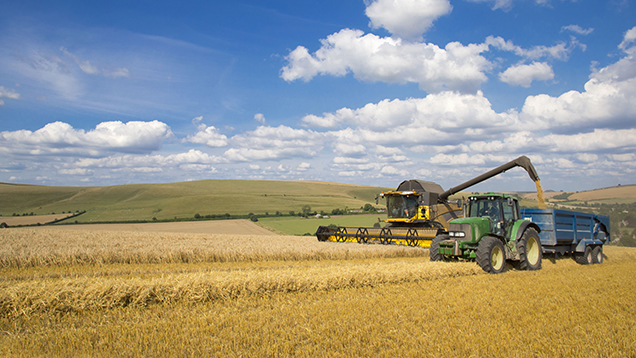Wheat crop yield tops 15.6t/ha in South Lincolnshire
 © Juice/Rex Shutterstock
© Juice/Rex Shutterstock South Lincolnshire grower David Hoyles, who broke the UK wheat yield record in 2011, saw his average wheat yield jump to 14t/ha this summer with his top crop at 15.61t/ha.
He puts his bumper yields down to good sunlight in the spring and early summer, and also using more nitrogen on his low-lying rich fertile silt soils on the edge of The Wash.
“The climate certainly helped us this year with wheat yields averaging 14t/ha, which is massive for us as we normally budget for 12t/ha,” he tells Farmers Weekly.
See also: Why wheat on the Wolds broke the yield world record
“The climate certainly helped us this year with wheat yields averaging 14t/ha, which is massive for us as we normally budget for 12t/ha”
David Hoyles, South Lincolnshire grower
He harvested 170ha of winter wheat this summer which is regarded largely as a break crop among his more profitable vegetable crops such as potatoes, beetroot and cauliflowers.
The wheat benefitted from better sunlight than usual as shown by his farm’s solar panels producing the most electricity in April, May and June since they were installed in 2011.
“We certainly had more sunlight this season helped by more wind and fewer sea frets,” he says.
Mr Hoyles grew 96ha of the feed wheat variety Evolution and the rest Santiago, with the Evolution averaging 14.57t/ha.
All fields of Evolution were drilled following mustard, sugar beet or potatoes.
His most fertile fields were sown at 125kg/ha and received 280kg/ha of nitrogen, which led to his highest yield, whereas poorer fields had higher seed rates and less nitrogen.
However, even his wheat on the poorer soils with just 140kg/ha of nitrogen fertiliser showed yields between 14.5t/ha and 15t/ha.
Mr Hoyles broke the UK yield record with a 14.3t/ha crop of the variety Invicta in 2011, which was bettered by fellow Lincolnshire grower Tim Lamyman two years later, who has since then pushed his top yields to 16.5t/ha this summer.
Yields were held back since 2011 by reduced light and high disease pressure, says Mr Hoyles, but this season saw good sunlight and also a low disease year.
Although Evolution has good resistance to the main cereal foliar diseases, Mr Hoyles is reluctant to cut his fungicide costs as sea mists can quickly encourage the development of diseases.
He uses a four-fungicide spray regime at his 550ha Monmouth House Farm, Lutton, about 12 miles east of Spalding, with plant growth regulators used as well since Evolution is taller strawed variety.

